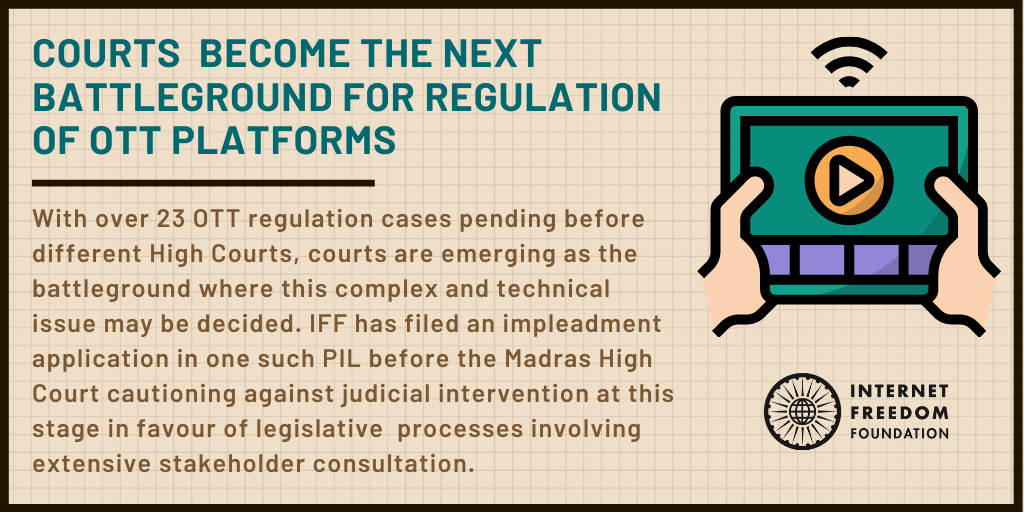
Tl;dr
IFF’s impleadment application has been tagged by the Madras High Court with a PIL seeking regulation of video streaming and video hosting platforms. In the impleadment application, we have tried to provide a bigger picture of the state of OTT regulation in India and cautioned against judicial intervention at this stage because it is a complex and technical issue best addressed through legislative and policy making processes involving extensive stakeholder consultation.
Background
On 05 August 2020, the Madras High Court issued notice in a PIL filed by a lawyer seeking regulation of content available on video streaming platforms (which host curated and commissioned content. Eg. Netflix) and video hosting platforms (which host user generated content. Eg. YouTube). The PIL alleges that these platforms are disseminating content which is abusive, obscene, adulterous and hurts religious sentiments. To address this problem, the PIL seeks establishment of a censor board to pre-screen online videos and it also seeks restrictions on the creation of YouTube accounts.
This PIL is one of several petitions filed before different High Courts across the country seeking regulation of OTT platforms. Fortunately, so far, the High Courts of Delhi, Bombay and Karnataka have declined to frame regulations for OTT platforms. However, in November 2020, the Ministry of Information & Broadcasting (MIB) informed the Punjab & Haryana High Court that over 23 OTT regulation cases were pending before different High Courts and a transfer petition would soon be filed before the Supreme Court. Therefore, with proliferation of such PILs, it is likely that cases relating to regulation of OTT platforms will be consolidated and transferred to the Supreme Court in the near future.
Regulatory Attempts
Regulation of OTT platforms has become a hot button issue in the past few years, and major industry players have tried to adopt a self-regulatory model which comes with its own set of problems. We had previously written to the Internet and Mobile Association of India (IAMAI) and cautioned against importing the model of television censorship into the online streaming space because a self-regulatory code which was privately devised by a handful of established players would harm innovation, disadvantage smaller new players and restrict viewer choice. In our follow up representation, we also warned about the creation of a Digital Content Complaint Council which could lead to overbroad and carterlized censorship.
More recently, in November 2020, the Cabinet Secretariat issued a notification stating that digital and online media including audiovisual programmes made available by online content providers falls within the jurisdiction of the MIB. This notification was issued under the Government of India (Allocation of Business) Rules, 1961 and we have previously explained why this notification by itself cannot justify licensing or content certification of OTT platforms unless supported by legislation enacted by Parliament. However, issuance of the notification has led to understandable nervousness about potential government regulation of OTT platforms which is reminiscent of the control exercised by MIB over films, television and radio.
Highlights of the Impleadment Application
IFF’s impleadment application was tagged with the PIL by the Madras High Court on 10 December 2020 and we expect the matter to be listed again after the winter break. We are extremely grateful to the legal team comprising Suhrith Parathasarathy and Surasika Parathasarathy for representing IFF before the Madras High Court in this case.
In the impleadment application, we have tried to provide a bigger picture of the state of OTT regulation in India and cautioned against judicial intervention at this stage for the following reasons.
First, while considering the need for additional regulation, we must be wary of drawing a false equivalence between online video hosting/streaming platforms and television and film broadcasting. Heavy handed regulation which is applicable to traditional mediums may not be necessary for the internet because of its unique technical features and emphasis on private viewing experiences. Adopting a one size fits all approach and imposing pre-certification requirements on these online platforms would destroy their ability to create unconventional, thought-provoking and innovative content.
Second, the fundamental right to freedom of speech and expression guaranteed under Article 19(1)(a) can be reasonably restricted in accordance with Article 19(2) only if there is a statute, rule or regulation. Therefore, Article 19(2) of the Constitution does not permit restrictions on online video hosting/streaming platforms in the absence of a legislation.
Third, there are a large number of remedies already available under the Indian Penal Code, 1860 and the Information Technology Act, 2000 to tackle illegal content shared on the internet. Specifically, under Section 79 of the IT Act, online video hosting platforms which host user-generated content already have an obligation to take down unlawful content after receiving actual knowledge of the same through a court order or a notification from an appropriate government agency. Similarly, video streaming platforms which host curated and commissioned content can be held liable for existing offences under the IT Act which prohibit electronic publication of obscene or sexually explicit content.
Any further regulation would be necessary only if there is a failure of market mechanisms. Moreover, this type of regulation should be formulated through the legislative process because extensive study and stakeholder consultation will be required due to the dynamic and technical nature of the online video hosting/streaming industry.
Important Links
- Impleadment Application filed by IFF before Madras HC (link)
- Previous post titled ‘Statement: Today’s notification on online news media and OTT platforms will require greater vigilance’ dated 11 November 2020 (link)
- Previous post titled ‘Read our follow up letter to Justice A.P. Shah on self-censorship by Hotstar and the IAMAI’s self regulation code’ dated 13 March 2020 (link)
- Previous post titled ‘Online video streaming and TV are not the same. So why is the IAMAI trying to make it so?’ dated 10 February 2020 (link)
